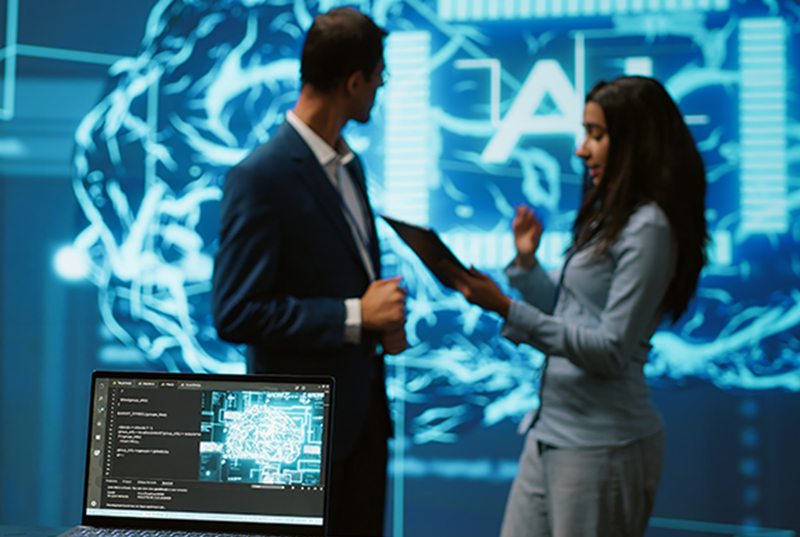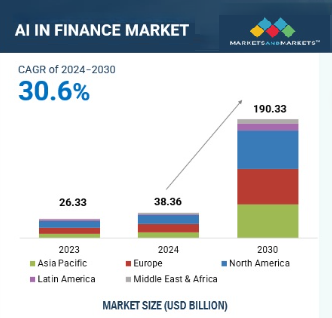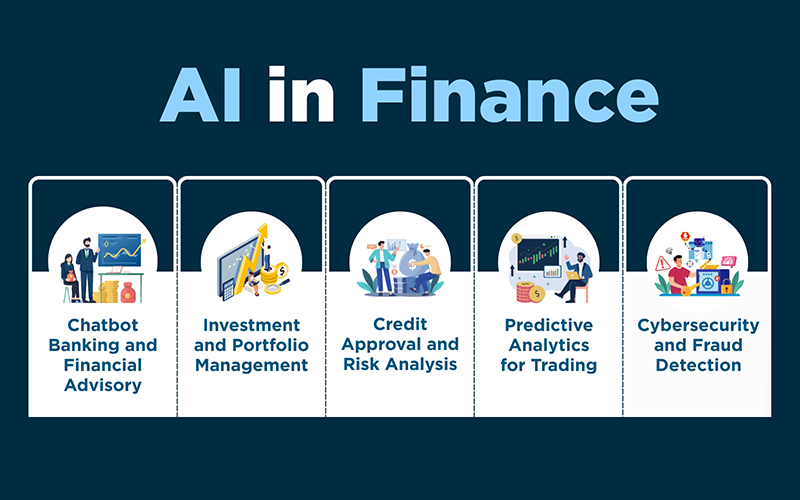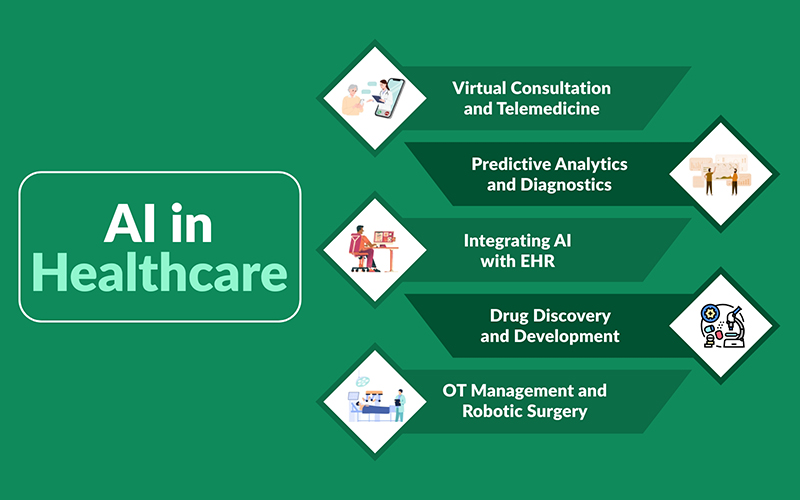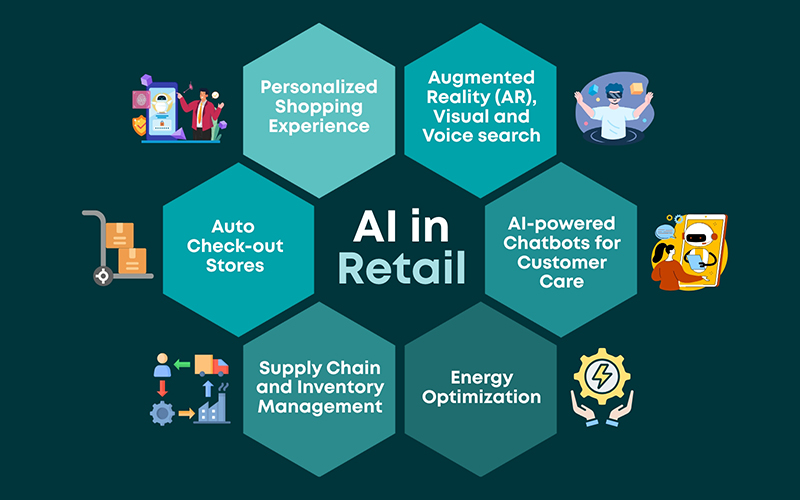Since prehistoric ages human have used technology to make their day-to-day tasks easier, and the evolution of technology runs parallel to the evolution of us from the stone age man to the modern or the post-modern beings that we’re now. It would only be right to say that technology from simple lever and pulley to quantum computing, AR and VR, IoT and more has definitely helped how we navigate our daily lives.
AI, with a market size of $279.22 billion in 2024, and projected to reach $1,811.75 billion by 2030, growing at a CAGR of 35.9% from 2025 to 2030, has found its application across industries, and is the most discussed buzzword in the market. AI is already changing businesses as we know it.
In this post, let’s discuss how AI Automation in Finance, Healthcare, and Retail is driving business and winning customers, and some of the challenges to be addressed.
“How can I help you?” to Fraud Detection: AI Boosts the Financial Sector
From customer interactions to assisting stock market trading from fraud detection to decision making, there are many benefits of AI-powered chatbots in banking. With its ability to process large data sets, AI provides faster and more accurate insights to stakeholders to help them make learned decisions than calculated risks unlike before.
Estimated at $38.36 billion in 2024, the global AI in Finance market is projected to grow at a CAGR of 30.6% to reach $190.33 billion in 2030. Some of the common areas where AI is already transforming the financial sector are in recommendation systems, fraud detection and risk management.
Chatbot Banking and Financial Advisory
Customer service in banking traditionally required huge manpower and used to be less efficient than desirable in the past. Long periods of waiting to get connected to an agent, language barrier, disparity in documentation etc. were things that used to prove very challenging to a smooth banking experience.
Nonetheless, since the introduction of AI-powered chatbots, most of the day-to-day banking operations have witnessed a marked difference to the delight of both the customers and the concerned financial institutions.
All routine tasks like handling enquiries, assisting with regular transactions, offering financial guidance and more are now being handled by AI-powered virtual assistants. These chatbots provide real-time support for customers, responding to queries about account details, loan applications, investment options, verifying KYC and others without the need for human intervention.
Investment and Portfolio Management
AI’s data-driven insights are changing the financial environment by enabling investors to make more learned decisions. Virtual assistants use AI algorithms to assess risks, analyze market movements and offer ideal investment options. These AI-driven wealth advisors offer tailor-made investment strategies, making wealth management easier to customers.
Credit Approval and Risk Analysis
Most of us already have loans and credit cards or are in need of it for one reason or the other. Traditionally we had to spend days running from pillar to post to get the approvals from the right people, sift through various documents, and then comes the waiting period that the creditor takes to evaluate our creditworthiness before approving a loan. Whereas, AI-driven systems can analyze vast datasets, including credit scores, transaction history, and spending patterns to assess risks instantly, and this has brought about a revolutionary change in the entire credit approval process.
Predictive Analytics for Trading
Finance is an extremely volatile market, and forecasting trade movements isn’t an easy task as it is dependent on various criteria. AI’s capability to analyze previous data and detect developing trends early on has given an edge to traders and investors in safely predicting market moves. AI-driven trading assistants can use predictive analytics to generate immediate suggestions based on economic data, interest rates, and geopolitical events.
Cybersecurity and Fraud Detection
Our financial documents and other personal information collected and stored in the systems of financial institutions constitute sensitive information, and as we know, financial fraud has become more sophisticated and traditional means of security is insufficient to prevent us from falling prey to scammers. AI algorithms can detect criminal activities by studying transaction trends in real time. Machine learning models can identify abnormalities such as suspicious financial transactions, irregular spending activities, or multiple unsuccessful login attempts, and alert financial institutions and customers about possible dangers before they develop.
From Front Desk to Operating Theatre: AI in Healthcare
AI is revolutionizing the healthcare industry in more ways than one. Apart from taking care of front office tasks like fixing clinical appointments to answering general queries, AI assistants can perform a multitude of functions like collecting and maintaining medical records, clinical decision support system (CDSS), and much more.
Valued at around $26.57 billion in 2024, the global AI in healthcare market size is estimated to grow at a CAGR of 38.62% from 2025 to 2030 to reach $187.69 billion. Here are a few common areas where AI is used in the healthcare industry:
Virtual Consultation and Telemedicine
AI-enabled chatbots and virtual assistants are driving virtual consultation where patients’ previous health records are scanned and symptoms are analyzed and medical recommendations are given. In case of critical illnesses, these virtual assistants can redirect patients to the proper medical specialists, take appointments for consultation and advise them on proper next measures to be taken.
Predictive Analytics and Diagnostics
Healthcare professionals can make use of AI’s ability to evaluate large datasets to identify the onset of critical illness, forecast pandemics, and take necessary measures to prevent them. AI can evaluate patient information like lifestyle, diet, exercise pattern, and even environmental factors to predict future health concerns even before they become evident.
Integrating AI with EHR
Electronic health records (EHR) of patients are an integral part of the healthcare ecosystem, and integrating AI with legacy EHRs or building a new AI-powered EHR system has many benefits. By saving time and effort of medical practitioners in taking clinical notes of patients and other administrative activities, AI can help them spend more time for patient care. Integrating AI with EHR systems for better patient care can further enhance the efficiency of healthcare providers by supporting them in clinical decision support systems (CDSS).
Drug Discovery and Development
AI is revolutionizing how new medicines are developed, tested and analyzed before pushing them into the market. Adaptive AI can accelerate the drug discovery process by analyzing vast amounts of biomedical data, and also in identifying potential drug candidates. It can help in faster and more efficient drug development by enabling researchers to optimize drug design, predict drug efficacy, and streamline clinical trials.
OT Management and Robotic Surgery
The applications of AI in the healthcare industry don’t stop with automating administrative and basic clinical tasks. AI-powered systems can help with in-patient management at hospitals by allotting beds, rooms and even scheduling and assisting with operation theatre (OT) management. Further, AI-powered robots can assist surgeons conduct difficult procedures with higher precision, reducing risks, and resulting in faster recovery periods and fewer problems.
From Warehouses to Your Living Space: AI Enhances Shopping Experience
Retail is perhaps one of the early adopters of AI, and its application has revolutionized the industry in the past couple of decades. Estimated at around $11.61 billion in 2024, the global AI in retail market size is projected to reach $40.74 billion by 2030, growing at a CAGR of 23% from 2025 to 2030.
AI has varied applications in retail ranging from inventory management at stores and warehouses to customizing supply chain and your purchase options at online stores. Here are a few:
Personalized Shopping Experience
Today’s customers are more discerning and personalizing their shopping experience is one of the greatest benefits that AI has brought to the retail industry. AI can analyze previous purchase history, browsing pattern and preferences to recommend customized products to individual customers while they shop online. This not only enhances customer experience but also helps retailers retain frequent shoppers, win their loyalty and boost sales.
Also, in the case of physical stores, an AI-enabled system can help you with the billing process and also give you insights on what products are hot selling. This can help you stock up your inventory accordingly. It can also give you predictions on products that might come in demand depending on weather conditions or other factors that might affect the market.
Augmented Reality (AR), Visual and Voice search
This is another application of AI that’s changing the way people shop online. The AR feature enables a shopper to virtually try out clothes, footwear, and other accessories without ever visiting a physical store. The same feature can help customers choose home décor, furniture and other appliances that fit into their domestic or official environment. After finding the suitable product, the customer can then place an order online, make the payment and get it delivered at their doorstep. This saves customers the trouble of visiting multiple physical stores and browsing through hundreds of options to find the right product.
Also, the improved voice recognition, natural language processing (NLP), and image detection features of AI makes browsing for products easier by eliminating the need for typing. Customers need to just input an image of the product they need or speak to the voice assistants like Alexa, Siri or Cortana to find and purchase what they need.
AI-powered Chatbots for Customer Care
This is an area where AI has made its presence much significant in the retail industry. AI-enabled chatbots can now process orders, handle enquiries, troubleshoot or rectify complaints and provide personalized recommendations without the need for any human involvement. Also, unlike traditional human-centric customer support, these AI chatbots are available 24X7, offering instant response thereby reducing wait time.
Auto Check-out Stores
Waiting in long queues to check out physical stores is fast becoming a thing of the past. Ai is changing the shopping experience of customers with automated checkouts in brick and mortar stores. Supermarkets or other shops can now use a combination of AI-enabled cameras, sensors and computer vision and let customers pick up their items in-store and leave without having to go through the traditional checkout process.
Supply Chain and Inventory Management
There are many benefits of AI in retail supply chain management. AI-enabled robots are now being used to move goods in large warehouses. Also, AI-powered cameras and sensors combined with smart systems can detect goods, take stocks, manage logbooks and produce reports to help inventory management in warehouses become more efficient.
The application of AI doesn’t end there. It can further use predictive analytics by evaluating previous data, industry trends and even weather, economic and geo-political patterns to anticipate market demands, thereby avoiding overstocking or understocking of goods.
Energy Optimization
Warehouses and manufacturing plants use a lot of energy, and inefficient use of energy can burn pockets for manufacturers. Effective deployment of AI can monitor energy-draining equipment used for lighting, heating, cooling and running machinery to use optimal energy thereby making them more energy-efficient and reduce cost.
Challenges
Notwithstanding the benefits of AI and regardless of which industry it is supporting, some of the common concerns to take into consideration are data privacy, algorithm bias, scalability, high-initial investment, regulatory compliance issues, and job displacement.
One of the first things to understand is that any AI system is only as good as you train it to be, the kind of data you feed, updating data to accommodate changing regulations and norms in the industry. You must make sure to train the AI with the right set of data and that too in encrypted format to avoid data theft, and do regular audits to check for regulatory compliance and algorithm bias.
As with job displacement, it is true that some of the traditional human-centric tasks can now be performed more efficiently by AI but the fear of job losses is not entirely true. As the efficient running of AI would require a skilled workforce that can maintain and update the system, proper upskilling of your workforce can help answer this concern.
High initial investment costs can be tackled by starting with pilot projects to evaluate ROI before full-scale adoption. And the scalability issue can be handled by using cloud-based AI solutions for scalable operations.
How DeepKnit AI Can Help You Streamline Process Automation
As with any major technological advancement, AI is here to stay and will keep evolving with time, and create new opportunities for innovation and growth across industries.
While AI in healthcare would improve diagnosis of new diseases and enhance patient care, the financial sector can leverage AI to detect fraud more efficiently and provide better wealth management solutions. Retail can benefit from more personalized shopping experience, better-managed operations, and improved customer care. Businesses that adapt AI as early as they can, can stay competitive and make profits, while also winning the loyalty of customers.
Nevertheless, efficient implementation of AI calls for a responsible approach valuing ethics, transparency and the right mix of talent. No matter which industry you come from, DeepKnit AI’s experts along with systematically trained and updated AI Agents can take care of all aspects of your business processes ranging from data mining to web scrapping, thereby giving you the time and peace of mind to focus on more business critical functions like innovation and growth strategies.
Looking to give the AI edge to your business?
Check out our Custom AI Agent Development Services.
Get Started Today

